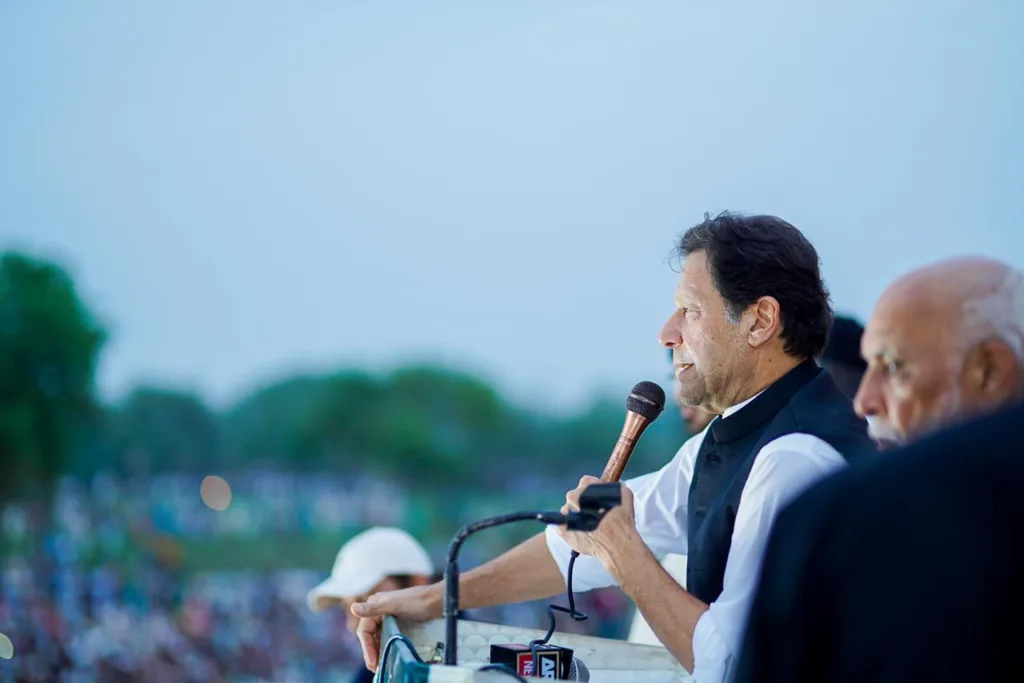Pakistan Cypher Leaked Turned Into Something Big

Imran Khan
Pakistan Cypher: In a riveting turn of events, secret Pakistan cable documents have come to light, revealing a deep-rooted web of political intrigue and international pressure aimed at the removal of Prime Minister Imran Khan. These documents, which have recently surfaced, underscore the complexities of global politics and the hidden manoeuvres that shape the fate of nations. From the geopolitical context to the potential ramifications, we dive into every facet of this astonishing development.
The cable has also been seen as a sign of the growing rift between the U.S. and Pakistan. The two countries have been allies for decades, but their relationship has been strained in recent years by a number of factors, including Pakistan’s close relationship with China, its support for the Taliban in Afghanistan, and its decision to remain neutral in the Russia-Ukraine conflict.
SECRET PAKISTAN CABLE DOCUMENTS U.S. PRESSURE TO REMOVE IMRAN KHAN:

The cable, which was obtained by The Intercept, was written by Pakistan’s ambassador to the United States, Asad Majeed Khan, and describes a meeting he had with two State Department officials on March 7, 2022.
In the cable, Khan describes how the U.S. officials expressed their displeasure with Khan’s government’s decision to remain neutral in the Russia-Ukraine conflict. The officials reportedly said that Khan’s decision had “emboldened” Russia and “undermined” the U.S.-led sanctions regime against Russia.
The U.S. officials also reportedly told Khan that his government’s ties to China were a source of concern for the U.S. They said that Pakistan’s close relationship with China was “not in the best interests of the United States” and that it could “jeopardize” U.S.-Pakistan relations.
The U.S. officials then reportedly made it clear that they wanted Khan to be removed from office. They said that if Khan was able to survive the no-confidence vote that was then pending against him, it would be “a major setback” for the U.S.-Pakistan relationship.
The cable has been met with mixed reactions. Some people have accused the U.S. of interfering in Pakistan’s internal affairs. Others have said that the cable simply reflects the U.S.’s concerns about Khan’s government’s policies.
The U.S. State Department has denied that it pressured Pakistan to remove Khan from office. However, the cable provides some evidence to the contrary. It is clear that the U.S. was unhappy with Khan’s government and that it wanted him to be removed from power.
It is still unclear what impact the cable will have on U.S.-Pakistan relations. However, it is a reminder of the complex and often fraught relationship between the two countries.
Decoding the Scandal
The release of the Secret Pakistan Cable Documents U.S. Pressure to Remove Imran has sent shockwaves throughout the international community. These documents, believed to be confidential correspondences, have highlighted a coordinated effort involving various stakeholders to exert pressure on the Pakistani government and oust Prime Minister Imran Khan from power. The documents provide a rare glimpse into the world of international diplomacy and the often-hidden dynamics that shape global affairs.
Geopolitical Context: A Delicate Balancing Act

The revelations within the secret cable documents have prompted an analysis of the geopolitical context surrounding Pakistan, the United States, and their respective allies. As tensions simmer in regions like Ukraine and Russia, the intricate dance of power and influence becomes evident. The United States’ desire to maintain strategic alliances and exert control in key regions is a driving force behind these alleged efforts to remove Imran Khan. These documents shed light on the delicate balancing act of international diplomacy and the complex motivations that underlie it.
The Players Involved: Unveiling the Puppeteers
One of the most intriguing aspects of the Secret Pakistan Cable Documents U.S. Pressure to Remove Imran is the revelation of the players involved. From high-ranking officials within the U.S. government to influential figures in Pakistan’s domestic landscape, the documents suggest a multi-dimensional conspiracy. Such revelations emphasize the interconnectedness of global politics and how decisions made behind closed doors can have far-reaching consequences.

“Honestly,” Lu is quoted as saying in the document, referring to the prospect of Khan staying in office, “I think the isolation of the Prime Minister will become very strong from Europe and the United States.
Implications for Pakistan’s Democracy: Strain and Resilience
The alleged efforts to remove Prime Minister Imran Khan carry profound implications for Pakistan’s democracy. The exposure of covert international pressure raises questions about the autonomy of the nation’s political processes. At the same time, these revelations could ignite a renewed sense of resilience and unity among the Pakistani populace, who may view external interference as a threat to their sovereignty. The outcome remains uncertain, but the impact on Pakistan’s democratic fabric is undeniable.
“There was also a feeling that while the U.S. expected Pakistan’s support on all issues that were important to the U.S., it did not reciprocate.”
Global Ramifications: Ripples Beyond Borders
Beyond Pakistan’s borders, the Secret Pakistan Cable Documents U.S. Pressure to Remove Imran has ignited discussions on the broader global ramifications. The exposure of such documents underscores the interconnectedness of nations and the ripple effects that political decisions can have on the international stage. It prompts us to question the extent to which governments shape one another’s destinies and the balance of power in an increasingly interdependent world.
You may also like to read about Pakistani Politics in the forthcoming future
March 7, 2022, Pakistani Diplomatic Cypher (Pakistan Cypher Transcription)
The cable shows that the U.S. was very unhappy with Pakistan’s position on the Ukraine crisis, particularly the Prime Minister’s visit to Moscow. The U.S. officials made it clear that they wanted Pakistan to change its position and that they would be willing to forgive Pakistan if the no-confidence motion against the Prime Minister succeeded.
The cable also shows that the U.S. was reluctant to engage with Pakistan at the highest level. The U.S. officials said that they did not think it was the right time to engage with Pakistan because of the political turmoil in the country. However, the Pakistani ambassador pointed out that the U.S. had engaged with India at the highest level, even though India had also abstained from voting on the Ukraine crisis.
The cable concludes by saying that the U.S.-Pakistan relationship has been damaged by the Prime Minister’s visit to Moscow. The Pakistani ambassador suggests that Pakistan should make a demarche to the U.S. to protest the U.S.’s interference in Pakistan’s internal political process.
Public Reaction of Pakistan Cypher: Outrage and Demand for Transparency
The release of these secret cable documents has triggered a range of reactions both within Pakistan and abroad. Many citizens express outrage at the idea of external forces influencing their nation’s leadership. There is a growing demand for transparency and accountability from governments and international actors involved. This wave of public sentiment underscores the importance of open dialogue and the need for leaders to address these concerns effectively.
Here are some additional thoughts on the cable:
- The cable shows that the U.S. is willing to use its influence to try to shape the outcome of political events in Pakistan. This is a reminder of the power that the U.S. has in the world, and it raises questions about the extent to which the U.S. should be interfering in the internal affairs of other countries.
- The cable also shows that the U.S. is concerned about Pakistan’s ties to China. This is a rivalry that is likely to continue to grow in the years to come, and it could have a significant impact on the global balance of power.
- The cable is a reminder of the importance of diplomacy in resolving international disputes. If the U.S. and Pakistan are able to work together, they can achieve a lot. However, if they continue to drift apart, it could be a major setback for both countries.
Pakistan Cypher Conclusion:
The release of the Secret Pakistan Cable Documents U.S. Pressure to Remove Imran brought to the forefront the intricate interplay of global politics and the forces that shape nations. As the world digests these revelations, it becomes clear that the path of international diplomacy is rarely straightforward. The implications of these documents will likely reverberate for years to come, prompting a reevaluation of power dynamics and the delicate balance of influence on the global stage.






1 thought on “Pakistan Cypher Leaked Turned Into Something Big”